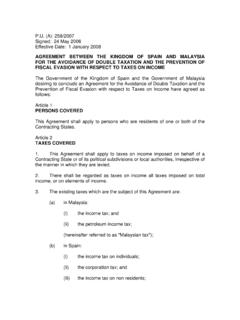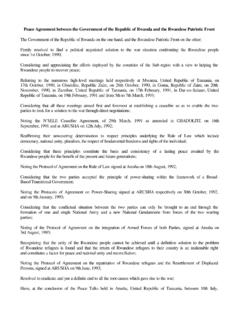Transcription of CONVENTION BETWEEN THE GOVERNMENT OF …
1 CONVENTION BETWEEN THE GOVERNMENT OF THE kingdom OF THAILAND AND THE GOVERNMENT OF THE UNITED STATES OF AMERICA FOR THE AVOIDANCE OF DOUBLE TAXATION AND THE PREVENTION OF FISCAL EVASION WITH RESPECT TO TAXES ON INCOME The GOVERNMENT of the kingdom of Thailand and the GOVERNMENT of the United States of America, Desiring to conclude a CONVENTION for the avoidance of double taxation and the prevention of fiscal evasion with respect to taxes on income, Have agreed as follows: ARTICLE 1 Personal Scope 1. This CONVENTION shall apply to persons who are residents of one or both of the Contracting States, except as otherwise provided in the CONVENTION . 2. Notwithstanding any provision of the CONVENTION except paragraph 3 of this Article, a Contracting State may tax its residents (as determined under Article 4 (Residence)), and by reason of citizenship may tax its citizens, as if the CONVENTION had not come into effect.
2 For this purpose, the term "citizen" shall include a former citizen whose loss of citizenship had as one of its principal purposes the avoidance of tax (as defined under the laws of the Contracting States), but only for a period of 10 years following such loss. In the case of the United States, the term "resident" shall include a former long-term lawful resident (whether or not so treated under Article 4) whose loss of residence status had as one of its principal purposes the avoidance of tax (as defined under the laws of the United States), but only for a period of 10 years following such loss. 3. The provisions of paragraph 2 shall not affect: a) the benefits conferred by a Contracting State under paragraph 2 of Article 9 (Associated Enterprises), under paragraphs 2 and 5 of Article 20 (Pensions and Social Security Payments) and under Articles 25 (Relief from Double Taxation), 26 (Non-Discrimination), and 27 (Mutual Agreement Procedure); and b) the benefits conferred by a Contracting State under Articles 21 ( GOVERNMENT Service), 22 (Students and Trainees), 23 (Teachers) and 29 (Diplomatic Agents and Consular Officers), upon individuals who are neither citizens of, nor have immigrant status in, that State.
3 4. The CONVENTION shall not restrict in any manner any exclusion, exemption, deduction, credit, or other allowance now or hereafter accorded: a) by the laws of either Contracting State; or b) by any other agreement BETWEEN the Contracting States. 5. Notwithstanding the provisions of subparagraph 4(b): a) Notwithstanding any other agreement to which the Contracting States may be parties, a dispute concerning whether a measure is within the scope of this CONVENTION shall be considered only by the competent authorities of the Contracting States, as defined in subparagraph 1(e) of Article 3 (General Definitions) of this CONVENTION , and the procedures under this CONVENTION exclusively shall apply to the dispute. b) Unless the competent authorities determine that a taxation measure is not within the scope of this CONVENTION , the nondiscrimination obligations of this CONVENTION exclusively shall apply with respect to that measure, except for such national treatment or most-favored-nation obligations as may apply to trade in goods under the General Agreement on Tariffs and Trade.
4 No national treatment or most-favored- nation obligation under any other agreement shall apply with respect to that measure. c) For the purpose of this paragraph, a "measure" is a law, regulation, rule, procedure, decision, administrative action, or any other form of measure. ARTICLE 2 Taxes Covered 1. The existing taxes to which this CONVENTION shall apply are: a) in the United States: the Federal income taxes imposed by the Internal Revenue Code, but excluding the social security taxes, (hereinafter referred to as "United States tax"); b) in Thailand: the income tax and the petroleum income tax (hereinafter referred to as "Thai tax"). 2. The CONVENTION shall apply also to any identical or substantially similar taxes which are imposed after the date of signature of the CONVENTION in addition to, or in place of, the existing taxes.
5 The competent authorities of the Contracting States shall notify each other of any significant changes which have been made in their respective taxation laws and of any official published material concerning the application of the CONVENTION , including explanations, regulations, rulings, or judicial decisions. ARTICLE 3 General Definitions 1. For the purposes of this CONVENTION , unless the context otherwise requires: a) the term "person" includes an individual, an estate, a trust, a partnership, a company, and any other body of persons; b) the term "company" means any body corporate or any entity which is treated as a body corporate for tax purposes; c) the terms "enterprise of a Contracting State" and "enterprise of the other Contracting State" mean respectively an enterprise carried on by a resident of a Contracting State and an enterprise carried on by a resident of the other Contracting State.
6 D) the term "international traffic" means any transport by a ship or aircraft except when such transport is solely BETWEEN places in the other Contracting State; e) the term "competent authority" means: i) in the case of the United States: the Secretary of the Treasury or his delegate; and ii) in the case of Thailand: the Minister of Finance or his authorized representative; f) the term "United States" means the United States of America and, where used in a geographic sense, includes any area outside the territorial sea of the United States which, in accordance with international law and the laws of the United States, has been or may hereafter be designated as an area within which the United States may exercise rights with respect to the exploration and exploitation of the natural resources of the seabed or its subsoil; the term "United States" does not include Puerto Rico, the Virgin Islands, Guam, or any other United States possession or territory.
7 G) the term "Thailand" means the kingdom of Thailand and any area adjacent to the territorial waters of the kingdom of Thailand which by Thai legislation, and in accordance with international law, has been or may hereafter be designated as an area within which the rights of the kingdom of Thailand with respect to the seabed and subsoil and their natural resources may be exercised; h) the terms "a Contracting State" and "the other Contracting State" mean the United States or Thailand, as the context requires; i) the term "tax" means United States tax or Thai tax, as the context requires; j) the term "nationals" means: i) all individuals possessing the nationality or citizenship of a Contracting State; and ii) all legal persons, partnerships, associations and any other entities deriving their status as such from the laws in force in a Contracting State.
8 2. As regards the application of the CONVENTION by a Contracting State any term not defined therein shall, unless the context otherwise requires, or the competent authorities agree to a common meaning, have the meaning which it has under the laws of that State concerning the taxes to which the CONVENTION applies. ARTICLE 4 Residence 1. For the purposes of this CONVENTION , the term "resident of a Contracting State" means any person who, under the laws of that State, is liable to tax therein by reason of his domicile, residence, citizenship, place of management, place of incorporation, or any other criterion of a similar nature. The term also includes that State and any political subdivision or local authority thereof. The term, however, does not include any person who is liable to tax in that State in respect only of income from sources in that State. For purposes of this paragraph, an individual who is not a resident of Thailand under this paragraph, and who is a United States citizen or an alien admitted to the United States for permanent residence (a "green card" holder) is a resident of the United States only if the individual has a substantial presence, permanent home or habitual abode in the United States.
9 If such individual is a resident of Thailand under this paragraph, he shall be considered a resident of both Contracting States and his residence for purposes of the CONVENTION shall be determined under paragraph 2. 2. Where by reason of the provisions of paragraph 1, an individual is a resident of both Contracting States, then his status shall be determined as follows: a) he shall be deemed to be a resident of the State in which he has a permanent home available to him; if he has a permanent home available to him in both States, he shall be deemed to be a resident of the State with which his personal and economic relations are closer (center of vital interests); b) if the State in which he has his center of vital interests cannot be determined, or if he does not have a permanent home available to him in either State, he shall be deemed to be a resident of the State in which he has an habitual abode.
10 C) if he has an habitual abode in both States or in neither of them, he shall be deemed to be a resident of the State of which he is a national; d) if he is a national of both States or of neither of them, the competent authorities of the Contracting States shall settle the question by mutual agreement. 3. Where by reason of the provisions of paragraph 1, a person other than an individual is a resident of both Contracting States, the competent authorities of the Contracting States shall settle the question by mutual agreement and determine the mode of application of the CONVENTION to such person. ARTICLE 5 Permanent Establishment 1. For the purposes of this CONVENTION , the term "permanent establishment" means a fixed place of business through which the business of an enterprise is wholly or partly carried on.












